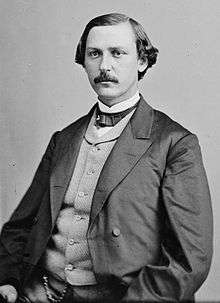Andrew J. Rogers
Andrew Jackson Rogers (July 1, 1828 – May 22, 1900) was an American lawyer, teacher, clerk, police commissioner and Democratic Party politician who represented New Jersey's 4th congressional district in the United States House of Representatives from 1863–1867.
Andrew Jackson Rogers | |
|---|---|
 | |
| Member of the U.S. House of Representatives from New Jersey's 4th district | |
| In office March 4, 1863 – March 3, 1867 | |
| Preceded by | George T. Cobb |
| Succeeded by | John Hill |
| Personal details | |
| Born | July 1, 1828 Hamburg, New Jersey, USA |
| Died | May 22, 1900 (aged 71) New York City, New York, USA |
| Political party | Democratic |
| Profession | Politician, Lawyer, Teacher, Clerk, Police Commissioner |
Biography
Born in Hamburg, New Jersey, Rogers attended common schools as a child. He was employed as a clerk in a hotel and a country store, engaged in teaching for two years, studied law and was admitted to the bar in 1852, commencing practice in Lafayette Township, New Jersey. He moved to Newton, New Jersey, in 1857 and continued to practice law.
In 1862, Rogers was chosen as the only Democratic Party member of the United States House of Representatives, serving in office from March 4, 1863, to March 3, 1867. He was also part of the House Committee that looked into the assassination of President Abraham Lincoln. Only the chairman, George Boutwell, the chairman of the House of Representatives Committee, was allowed to look into the relevant papers. Afterwards, Rogers accused him of being involved in an attempt to cover-up Edwin M. Stanton's role in the assassination.[1] As a Congressman, Rogers served on the Joint Committee on Reconstruction which drafted the Fourteenth Amendment to the United States Constitution.
After being unsuccessful for reelection, Rogers moved to New York City in 1867 and became counsel for the city in important litigation. He moved to Denver, Colorado, in 1892 and served as police commissioner of Denver. He returned to New York City in 1896 and died there on May 22, 1900. He was interred in Woodlawn Cemetery in New York City.
References
- Spartacus Educational http://spartacus-educational.com/USArogersPJ.htm
External links
- United States Congress. "Andrew J. Rogers (id: R000387)". Biographical Directory of the United States Congress.. Includes Guide to Research Collections where his papers are located.
- Andrew Jackson Rogers at The Political Graveyard
- Andrew Jackson Rogers at Find a Grave
| Wikimedia Commons has media related to Andrew Jackson Rogers. |
| U.S. House of Representatives | ||
|---|---|---|
| Preceded by George T. Cobb |
Member of the U.S. House of Representatives from New Jersey's 4th congressional district March 4, 1863 – March 3, 1867 |
Succeeded by John Hill |